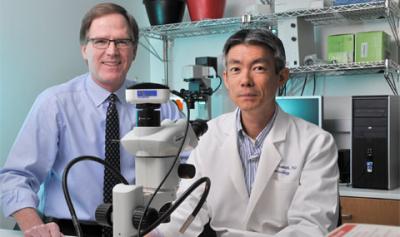New driver of atherosclerosis offers potential as therapeutic target

This is Dr. Shaul,UT Southwestern Medical Center. Credit: UT Southwestern
Atherosclerosis is characterized by the build-up of lesions (or plaques) formed from lipids, such as cholesterol and fatty acids. Ruptured plaques can partially or completely block blood flow, potentially leading to a heart attack or stroke. A member of a larger family of molecules known as oxysterols, 27HC is produced during the normal breakdown of cholesterol and is known to accumulate in atherosclerotic plaques.
The new study, conducted by a team of UT Southwestern researchers led by senior author Dr. Philip Shaul, sought to identify the impact of 27HC on atherosclerosis. Dr. Shaul is Vice Chair for Research and Professor of Pediatrics, and Director of the Center for Pulmonary and Vascular Biology at UT Southwestern. The study's findings – first-authored by Dr. Michihisa Umetani, Assistant Professor of Pediatrics and Pharmacology – were recently published in Cell Metabolism.
Using animal models and other strategies, the researchers found that 27HC promotes the formation of atherosclerotic plaques, causing a doubling in the accumulation of lipids in the arterial wall. 27HC achieves this buildup through mechanisms mediated by estrogen receptors, which normally enable the hormone estrogen to protect against the development and progression of atherosclerosis. By blocking estrogen receptors, 27HC prevents the beneficial effects of estrogen and promotes atherosclerosis.
“When 27HC is present, estrogen's protective effects are only observed at very high levels of the hormone,” said Dr. Shaul, holder of the Associates First Capital Corporation Distinguished Chair in Pediatrics. “This result may explain why hormone therapy with estrogen does not provide cardiovascular benefit in women with pre-existing atherosclerosis, in which 27HC is abundant in the vascular wall.”
Probing further into the underlying mechanisms, the researchers discovered that 27HC triggers inflammation in the arterial wall, a key step in the establishment of atherosclerotic plaques. This detrimental effect was characterized by exaggerated production of molecules that drive inflammation, called cytokines, and enhanced attachment on the arterial wall of immune cells known as macrophages. It is the recruitment of macrophages that then accumulate lipids (such as cholesterol) that triggers the formation of atherosclerotic plaques.
“Although statins have had a dramatic impact on cardiovascular health by lowering cholesterol, we still need complementary methods to combat atherosclerosis,” Dr. Shaul said. “Targeting 27HC, either by lowering the levels of this compound or by inhibiting its actions, could potentially provide a complementary approach to preventing vascular disease.”
Other UT Southwestern researchers involved in the study include Dr. Pritam Ghosh, Assistant Professor of Internal Medicine; Dr. Tomonori Ishikawa, postdoctoral research fellow in Pediatrics; Dr. Chieko Mineo, Associate Professor of Pediatrics; and Junko Umetani and Mohamed Ahmed, research assistants in Pediatrics.
The study was funded by support from the National Institutes of Health, the American Diabetes Association, and an unrestricted endowment provided to Dr. Shaul by the Associates First Capital Corporation.
About UT Southwestern Medical Center
UT Southwestern, one of the premier academic medical centers in the nation, integrates pioneering biomedical research with exceptional clinical care and education. The institution's faculty includes many distinguished members, including six who have been awarded Nobel Prizes since 1985. Numbering more than 2,700, the faculty is responsible for groundbreaking medical advances and is committed to translating science-driven research quickly to new clinical treatments. UT Southwestern physicians provide medical care in 40 specialties to nearly 91,000 hospitalized patients and oversee more than 2 million outpatient visits a year.
Media Contact
All latest news from the category: Health and Medicine
This subject area encompasses research and studies in the field of human medicine.
Among the wide-ranging list of topics covered here are anesthesiology, anatomy, surgery, human genetics, hygiene and environmental medicine, internal medicine, neurology, pharmacology, physiology, urology and dental medicine.
Newest articles

“Nanostitches” enable lighter and tougher composite materials
In research that may lead to next-generation airplanes and spacecraft, MIT engineers used carbon nanotubes to prevent cracking in multilayered composites. To save on fuel and reduce aircraft emissions, engineers…

Trash to treasure
Researchers turn metal waste into catalyst for hydrogen. Scientists have found a way to transform metal waste into a highly efficient catalyst to make hydrogen from water, a discovery that…

Real-time detection of infectious disease viruses
… by searching for molecular fingerprinting. A research team consisting of Professor Kyoung-Duck Park and Taeyoung Moon and Huitae Joo, PhD candidates, from the Department of Physics at Pohang University…





















